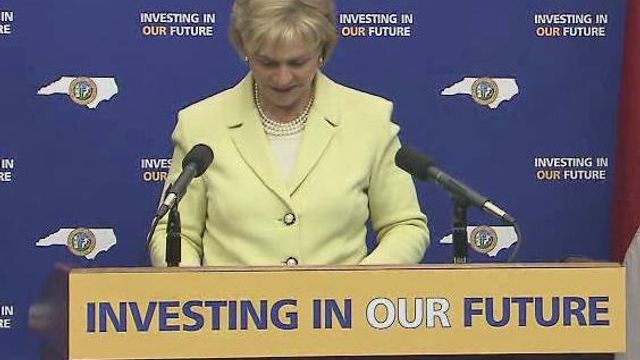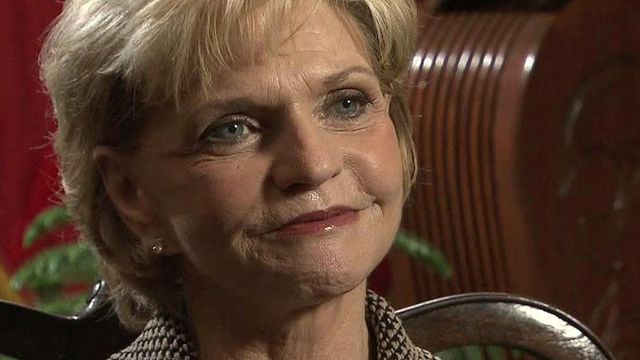Perdue's budget includes sales tax, salary increases
Gov. Bev Perdue unveiled a $20.9 billion budget proposal Thursday that includes a three-quarter-cent sales tax increase for education and a 1.8 percent average salary increase for teachers and state employees, who haven't had a raise in four years.
"This budget, from my perspective, is very ambitious," she said. "It underscores, for me, the priorities of what this state's all about."
In her final budget proposal as North Carolina's chief executive, Perdue's spending plan has the markings of a last stand against the Republicans when it comes to public education. Her plan adjusts the second year of a two-year budget the Legislature approved in 2011 over her veto.
Perdue is leaving office at the end of the year, and she hopes the sales tax increase will restore spending cuts to the public schools made by Republicans. The proceeds would help eliminate mandated cuts for local school districts that are projected to reach $500 million.
Republicans in charge of the Legislature have said they aren't considering higher sales taxes this year, especially since they ran on a platform in 2010 to do away with a temporary penny sales tax created by Democrats in 2009. The GOP allowed it to expire last July despite Perdue's recommendation to leave most of it in place.
Senate leader Phil Berger, R-Rockingham, released a statement Thursday, saying the governor's proposal "could shatter our fragile economic recovery."
"Governor Perdue’s budget would force North Carolina families and businesses to pay nearly $1 billion in new job-killing taxes," Berger said. "We must break state government’s habit of throwing money at problems and adopt innovative solutions and meaningful reforms. The cycle of irresponsible taxing, borrowing, and spending must stop.”
Throughout the 192-page budget book, Perdue notes that much of her new spending would restore cuts made by lawmakers in 2011. With the exception of a handful of tax credits targeted to small businesses and specific industries, it does not create new programs or layout a new agenda.
"The budget, from my perspective, is very ambitious," Perdue said. "It speaks to the future of North Carolina. It speaks to an investment in education, which is the hallmark of our state...All the initiatives I've been such a part of are continued in this budget."
Asked about the legislature's resistance to any tax increase, Perdue said she hoped lawmakers would see the need for the expanded spending she has proposed.
"I'm hopeful they will not consider this budget dead on arrival," she said.
Asked the same question, Perdue budget adviser Andy Willis said the sales tax was not the only way lawmakers could find extra money for education.
"There are other ways to get to that number without the sales tax," Willis said. However, he would not enumerate what those options might be.
“Gov. Perdue’s budget proposal is, disappointingly, more of the same failed approach that led to the fiscal mess the Republican legislative majority inherited," House Speaker Thom Tillis said in reaction to Perdue's proposal.
Perdue's budget proposal provides a net increase of $562 million to public schools, most of which would be used to eliminate flexibility cuts that school districts have had to make over the past several budget cycles. She plans to require local school districts to invest that funding in teachers, teaching assistants and other aspects of the classroom.
While Perdue would raise the sales tax, she would cap the state's gas tax at 37.5 percent for one year. Currently, drivers pay 38.9 cents per gallon.
The budget proposal also includes:
- $503 million to reverse flex cuts to public schools
- $92 million to reduce class size in kindergarten through third grade
- $10 million for hand-held reading diagnostic tools
- $145 million to boost funding for universities, $35 million of which would go toward financial aid
- $53 million to boost funding for community colleges
- A tax credit for companies that hire unemployed workers.
- Programs to boost the film and clean energy sectors.
- Tuition assistance for veterans and dependents at North Carolina community colleges and universities.












